None
Arbiter
- Joined
- Sep 5, 2019
- Messages
- 2,142
It could be. As long as they don't forget they're making a game, and not whatever the fuck CK3/Victoria 3 are.idk bros, this all sounds like
It could be. As long as they don't forget they're making a game, and not whatever the fuck CK3/Victoria 3 are.idk bros, this all sounds like
Tinto Talks #4 - March 20th, 2024

Welcome to the fourth iteration of Tinto Talks!
Today we’ll give you an overview of the different mechanics of the Government part of the game. There will be development diaries going into much more detail for these later on.
First of all, we have 5 different government types in the game, which determines a fair bit of what type of mechanics you get access to. As an example, a Republic does not have access to royal marriages, and a Steppe Horde has a different view on how war, peace and conquest works compared to other types of countries.
- Monarchy, which uses Legitimacy
- Republic, which uses Republican Tradition
- Theocracy, which uses Devotion
- Steppe Horde, which Horde Unity
- Tribe, which uses Tribal Cohesion
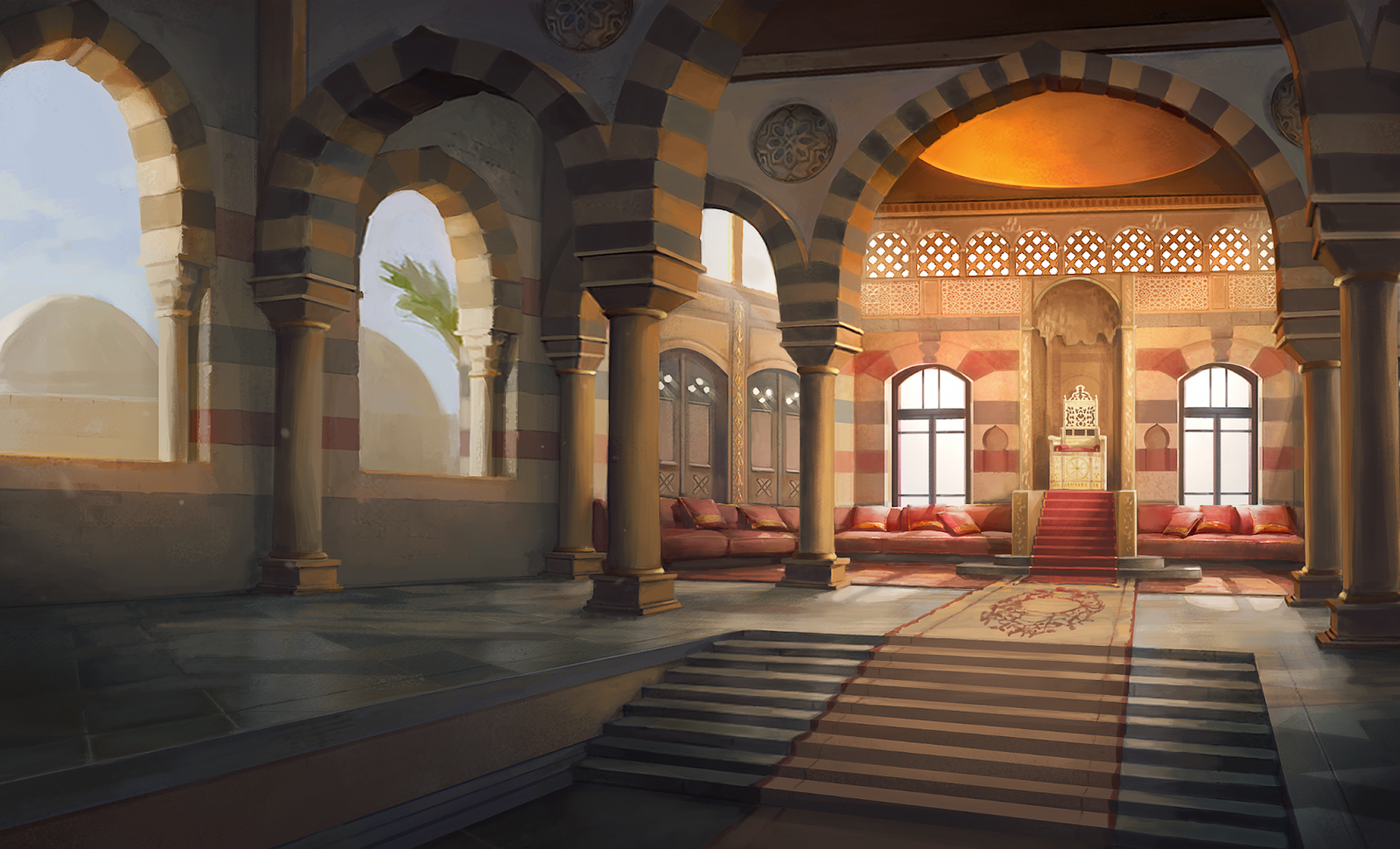
An illustration from our game..
These, together with country rank, government reform, and local flavor gives countries names like “Crown of Aragon,” “Kingdom of Sweden,” “Principality of Wales.” Not all countries are countries that are based on owning locations on a map though; more on that in later development diaries.
Each country also has a ruler, or they may be in a regency, if there are no possible adult heirs.
One of the most defining parts of the government of a country in Project Caesar is the Estates mechanic. This has been one of the core parts of the game, with a full connection between the population and the estates. Keeping the estates satisfied while keeping their powers low is an important part of the gameplay loop. In this game, the Estates are also active entities and will do things on their own if they get enough power.
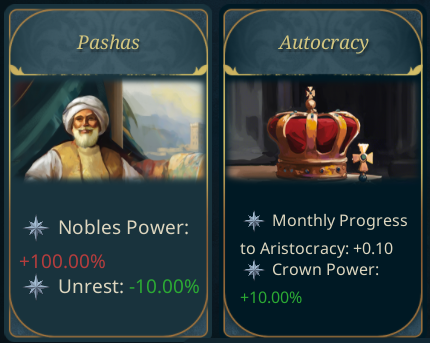
Two government reforms, one culture specific and one government specific.
As time passes, different government reforms and reform-slots will be available. They can also be based on tag, culture or religion.
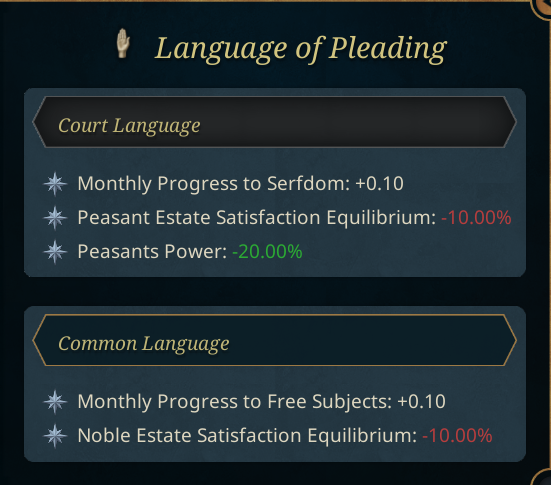
These are the two available possibilities in the Law 'Language of Pleading' for the country I tested.
Something that is different from a reform is what we call a Law. A Law can have several different policies you can pick from, and several laws have unique policies only available to certain tags, religions, cultures, government types or other factors.
There are some drawbacks to adding new reforms or policies though, as it takes a few years for it to have full effect, depending on your country's administrative efficiency. (Yes, it's a name for something else in another game, but it fits here.)
Regularly, if your government allows it, you can call in a Parliament. If you don’t do it often enough the estates will start to get irritated, but each parliament has issues that need to be resolved, and the estates will have agendas they want done for their support. Of course, you also have options to push through what you want from a parliament, if you are willing to accept the demands of the estate, like changing a particular law.
Another part of the government is the cabinet, which also grows in size as you become more advanced, allowing you to do more things. This is something that can be viewed as a hybrid between EU4 Advisors and the CK2 council actions.
Some of you may remember the domestic policies from EU2 and EU3. In Project Caesar we are bringing the idea back in the form of Societal Values. There are seven that we took from these games, one that was split in two, and we added four new ones, bringing the total to 13 different Societal Values. Societal Values are primarily affected by what other actions you do, like what policies you pick in a law, or what reforms you pick. As with so many other things in our game, this is not an instant action, but a gradual change over time.
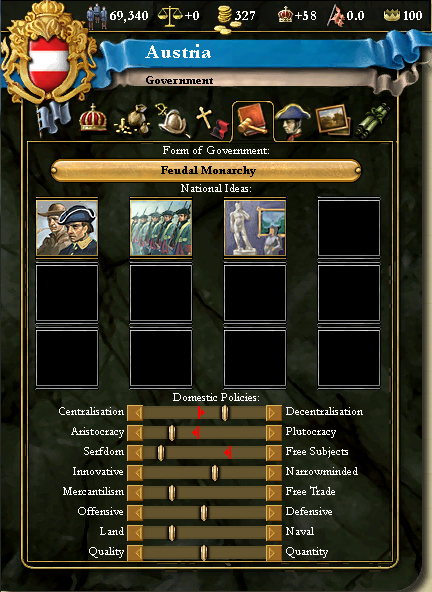
oh look, its eu3!
Next week, we will go into much more detail about estates and how they work.



Nope. It will be old luddite backward non-progressive moving toy soldiers on the map.Gonna laugh my ass off if it ends up with Vicky 3's combat system. Nothing says fun like autopilot military /s .

Let's not conflate Johan with the rest of Paradox too much. I do find it ironic defending him after all these years of shitting on him, but he's a league above his peers. Wiz's worst is Victoria 3. Johan's worst is Imperator, which I'd argue was/is far more salvageable than what Wiz put together.Sounds good, almost like someone killed Johan and is now impersonating him. But then, I remember the optimism when Vic 3 was in the works. "Guys, pops! And a new war system without the stupid toy soldier micro! Deeper political system!" Never underestimate Paradox's ability to go full retard.
Yeah, Imperator's a genuinely cool game with no polish and lack of content. Vic3's a polished turd.Let's not conflate Johan with the rest of Paradox too much. I do find it ironic defending him after all these years of shitting on him, but he's a league above his peers. Wiz's worst is Victoria 3. Johan's worst is Imperator, which I'd argue was/is far more salvageable than what Wiz put together.


Tinto Talks #5 - March 27th, 2024
Welcome to the fifth Tinto Talks, where we talk about the design for our upcoming top secret game with the codename ‘Project Caesar.’
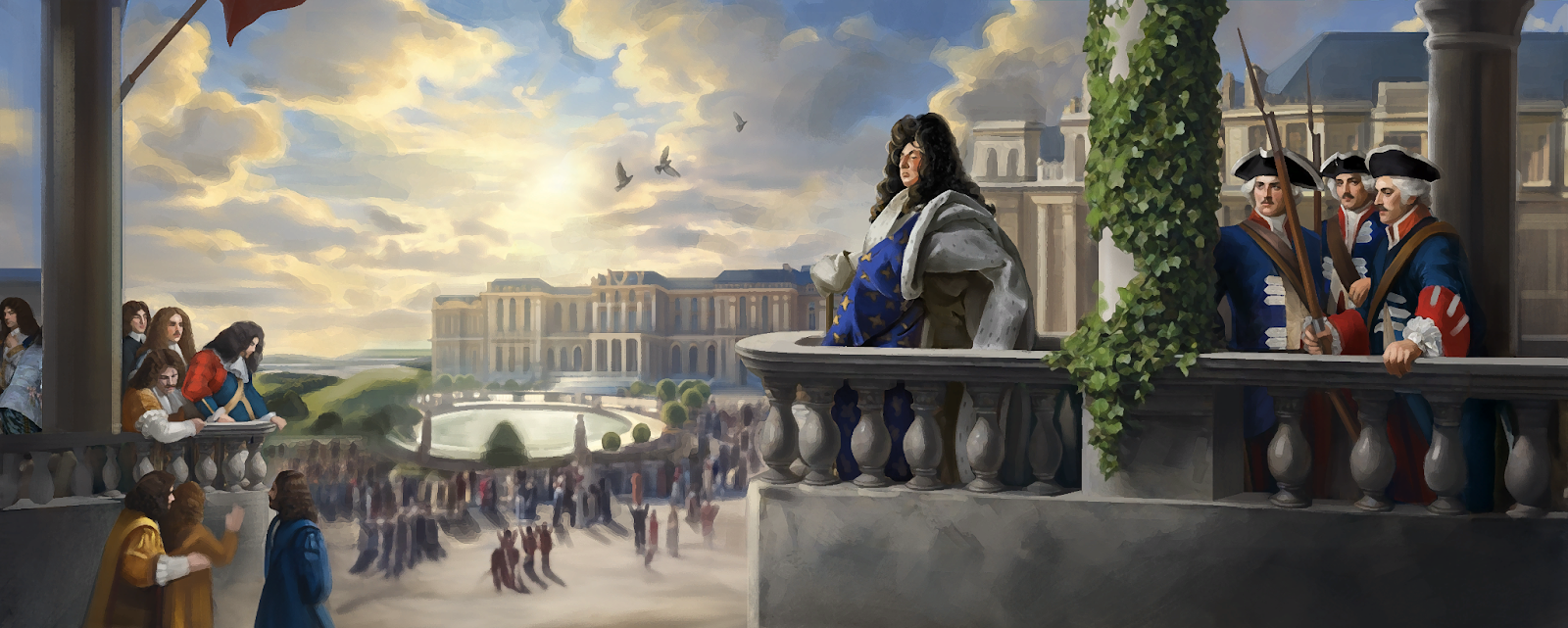
The state is me! Oh, you meant E-state, sorry.. not me ..
Today we will go into detail about one of the core systems in the game, and talk about how estates work.
First of all, there are four estates in Project Caesar, which mostly map 1 to 1 with a social class: Nobility, Clergy, Burghers and the Commoners. There is also the Crown, which represents the state itself.
Each estate gains power based on the amount of population belonging to the estate, which is also modifiable by local attributes of where the population is, where some nobles may have very high power in a certain area, or whether a specific city has entrenched burgher rights there.

This is the estates part of the government view, where you can see their power, current satisfaction, the equilibrium its trending toward, and what privileges it currently has.
Johan has confirmed the start date at April 1, 1337.

That sounds a lot like he played MEIOU mod and liked what he saw...I always liked the concept of estates, just never thought any of the implementations were that great. Also making an appearance is research speed, food production, taxes, and estates investing their own money.
Given Johan's track record, I anticipate it to turn into Project Merlin with 10 different kinds of mana
He himself is an incompetent fuck that openly championed casualization of their strategy titles. Fucking Imperator was his magnum opusIt is interesting how Johan openly shits and berates almost every design decision in his comments. Like, that idiotic circle with UI notifications from CK3 and V3 - he said he hates it with passion. Or how warfare will NEVER be like Victoria 3. It is like a nice spit in the face of incompetent fucks who failed the projects they were assigned to. Given recent failuers of victoria 3 it may give us hope that dev team could be fired or mnagement changes may happen to overhaul the game to a playable state.
Tinto Talks # 7 -10th of April
Welcome to the seventh edition of Tinto Talks, where we talk about really super secret stuff, that is hidden behind the code name of ‘Project Caesar’.
Today we’ll look into what makes up the economy in Project Caesar. Obviously, we’ll go into much more detail on some of these aspects in later Tinto Talks. Right now though, we’ll go through the incomes and expenses of a country in the game.
Every month you have running incomes and expenses that need to be balanced, and if your balance is positive, your gold is increased and you can use that gold to invest in other things.
And with balancing incomes and expenses, of course there are sliders. Having some buttons for just a few possible options for taxes or expenses, like in Imperator, is not really fitting for a GSG with deep economical gameplay.
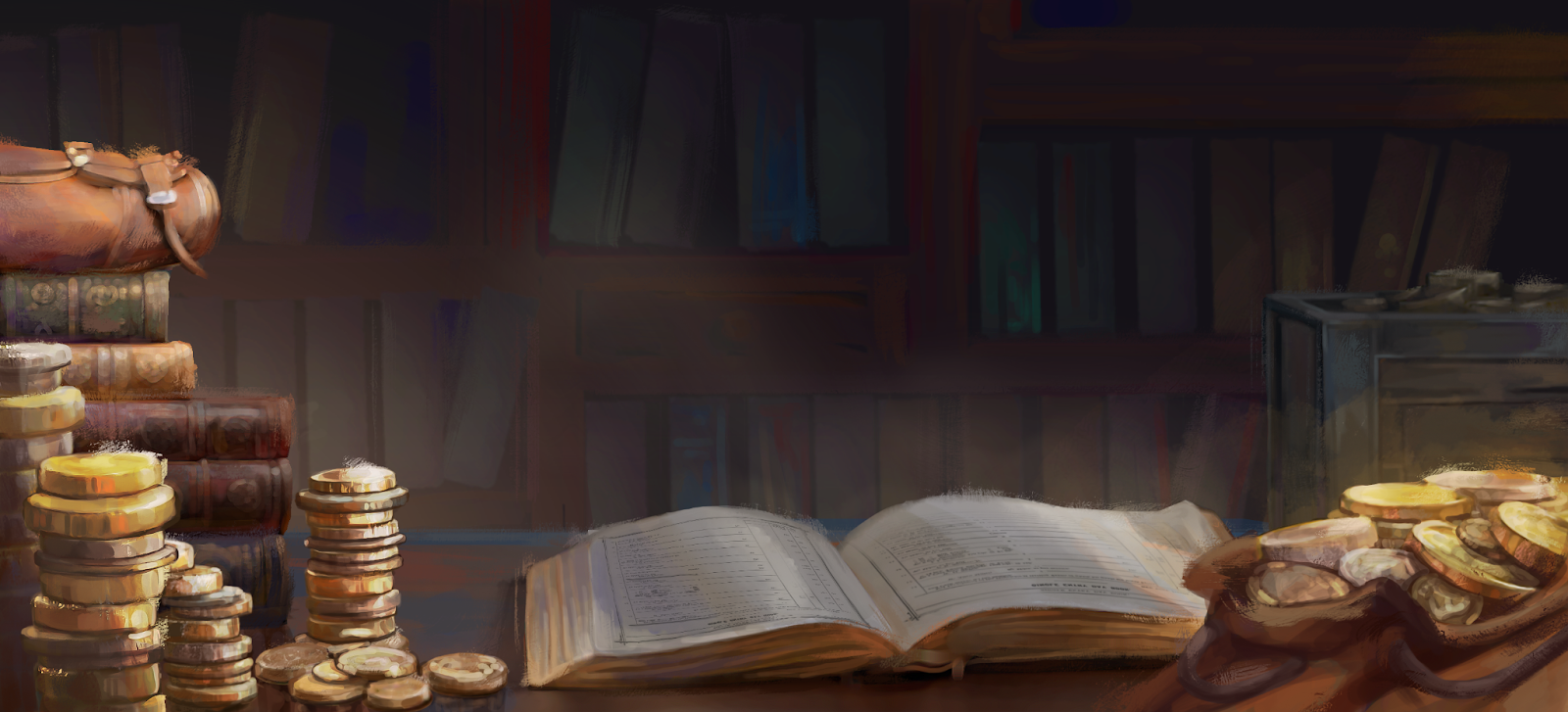
Incomes
If we start with income, you have trade-related incomes, which is a system we will delve deep into in early May, as well as diplomatically related income. You also gain gold from provinces (not locations) that sell surplus food they can not store in their local market. Neither of these you directly control with any slider though.
The bulk of most countries' income will come from taxes though, and taxes in Project Caesar are really different than before. First of all, every estate has a possible tax base, a concept we will delve into much more detail next week. This you can attempt tax from them, but every estate has a maximum tax you can take from them, which depends on your laws and their privileges, and how much power they have in your country. The higher the tax you take from them, the lower their satisfaction equilibrium becomes. Some examples of tax affecting things include the Catholic religion which limits the taxes on Clergy, and also the ‘Auxilium et Consilium’ estate privilege for the nobles, which reduces the tax they pay.
Finally, for something that has existed in some older of our games, we have minting. Now what is that you may ask? Minting is the possibility to get more money by printing more coins. It just has the slight drawback of increasing your inflation the more you do it.
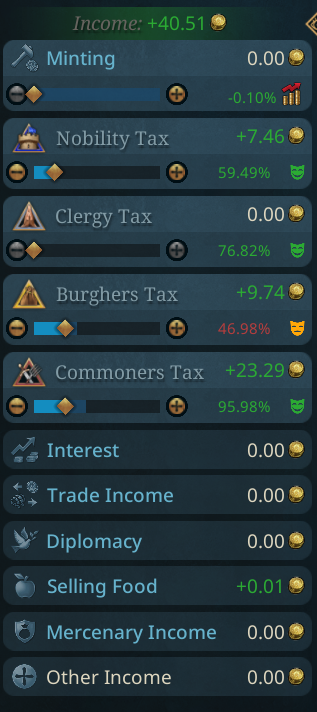
Here we have the possibility to tax the commoners a fair bit more…
Expenses
We all do love gaining gold, but sadly we also have to spend it, and while we can reduce some of the spending, we can not completely avoid all of it.
First of all, we have the Cost of the Court. This is something that is directly correlated to the economic base of your country, and if you spend less gold than expected, your legitimacy, or equivalent applicable government power, will decrease over time, and the more you spend, the more legitimacy can increase. There are advances, laws, and other things that impact how much you need to spend here.
Then we have the cost for your standing army and navy, where spending less reduces their fighting capability. This is nothing new to our GSG games, so I am not sure why I need to mention this here.
Fort Maintenance is another common economic expense from our games, which is here as well. If you don’t pay, garrisons don’t tend to stick around.
Culture, this is an entirely new concept, which will become available in the Age of Renaissance, where you can invest money to get [TO BE TALKED ABOUT LATER], while also impacting your prestige.
You can also decide how much you wish to spend on your colonial charters, which is a new system we will talk about later this year.
Finally, the last thing you can impact with a slider is your investment in stability. The cost for how much your investments are needed depends on the size of your country, with different laws and societal values impacting it as well. Stability in itself ranges from +100 to -100, and will decay towards 0 on its own. There are two other ways to impact your stability gain, besides investing gold as mentioned here. One of them relates to the cabinet system, but another is a more long-term impact from how your country is built up, as it is based upon how many clergy pops you have of your state religion compared to the total population.
There are other expenses as you can see below, but one important thing to mention is that provinces that lack food will try to buy it from the local market.
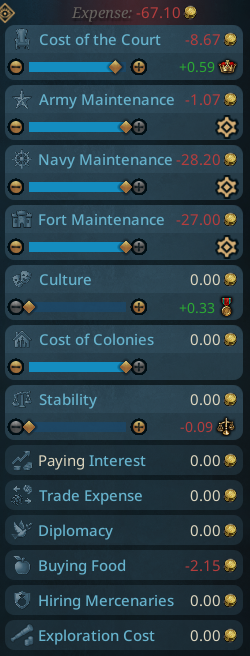
Maybe maybe we should cut down on our fleet, and maybe we don’t need ALL those forts. Our standing army of 200 brave footmen is enough!
Next week we’ll talk more in depth about how the tax base functions, how the food system works, and some other related issues.
This startdate pretty much ensures massive deviations from the historical Early Modern Era, and I don't like this. This decision will turn EUV from a game about early modern times and colonialism and age of discovery, into a fun Late Middle Ages simulator for the first 100 years. Which I don't think is a coincidence because PDS know that this is how long people are playing for in a campaign.Johan has confirmed the start date at April 1, 1337.
A far more interesting start than 1444. As an aside, I like that they aren't coloring in the wastelands. I've always hated how that looks in EU4.
MEIOU starts at 1356 and is fine, so I'm not too worried about it.This startdate pretty much ensures massive deviations from the historical Early Modern Era, and I don't like this. This decision will turn EUV from a game about early modern times and colonialism and age of discovery, into a fun Late Middle Ages simulator for the first 100 years. Which I don't think is a coincidence because PDS know that this is how long people are playing for in a campaign.
Tbh I kinda liked the challenge of the BYZ start.Besides, it's an additional hundred years for Byzantium to play (the choice of the map was not accidental)
I know it does, but this is not relevant.MEIOU starts at 1356 and is fine, so I'm not too worried about it.







